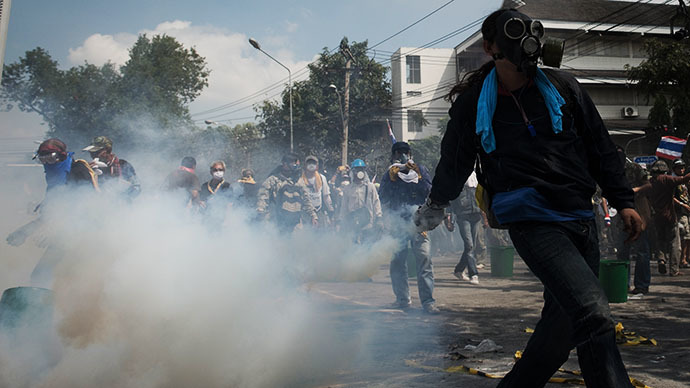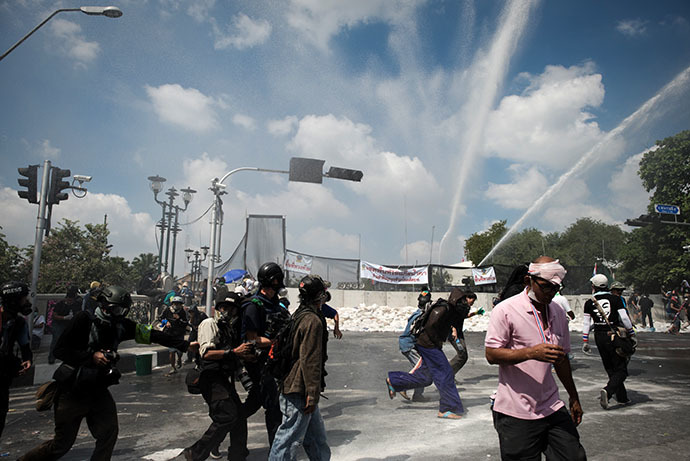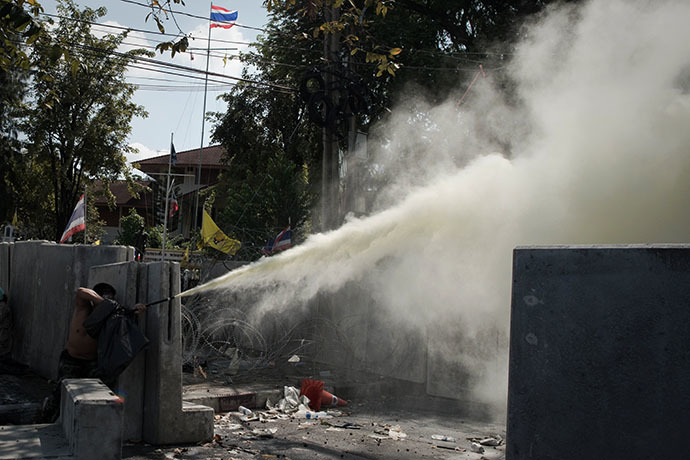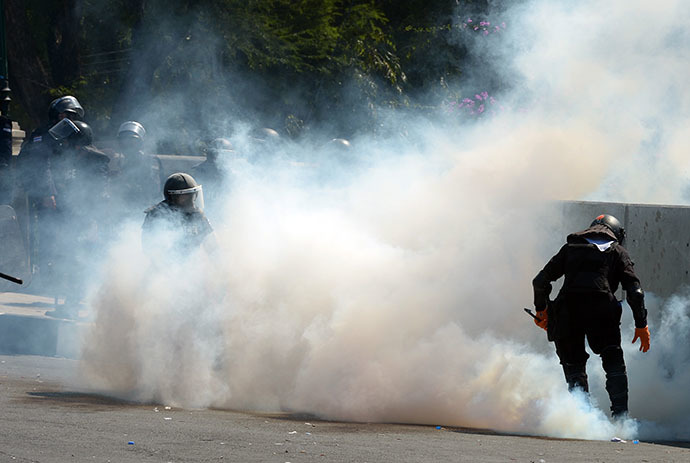Bangkok police use tear gas on protesters besieging govt buildings (PHOTOS)
Police dispersed activists with tear gas who were attempting to storm Bangkok’s Government House amidst deadly clashes in the Thai capital. Opposition protesters are calling for the ouster of Prime Minister Yingluck Shinawtra.
Anti-government activists, seeking to storm the Government House, ripped down barriers outside the official building, reporters told AFP. In response the Bangkok police fired tear gas canisters and used water cannons to push back the crowd of protesters. Prime Minister Yingluck has vacated the Government House and is overseeing the situation from an undisclosed location in the city. Hundreds of activists also took control of Thai state broadcaster PBS.
The opposition protest movement has pledged to topple the government of Prime Minister Yingluck Shinawtra and install a “people’s council.” On Sunday protest leader, Suthep Thaugsuban, called on his supporters to push for the ouster of the Shinawatra government.
“Seizure of the PM’s office, police headquarters and several ministries will paralyze this corrupted and illegitimate government,” said Suthep, whose comments were broadcast by Bluesky Television network. “Without the works of these key ministries, the government will stop most of its functions and finally collapse.”
Anti-government protests having been happening in the Thai capital for the past 7 days and had been relatively peaceful. On Saturday night demonstrations descended into violence as anti-government activists attacked a pro-government rally.
Around 70,000 government supporters, or “red coats,” had gathered in Bangkok’s Ramkamhaeng arena for a rally on Saturday. Later in the evening gunmen fired into the stadium killing at least two people and injuring dozens more.
“Students were inside the compound of the university when all of a sudden a gunman fired several shots through the fence of the university injuring many students,” Attiwat Nakpao, deputy leader of a Ramkamhaeng University student group, told local media.
In spite of the violence during the night, firebrand opposition leader, Suthep Thaugsuban, called on his supporters for peaceful action.
“Our operation today must be peaceful and non-violent... enter places with politeness,” said Suthep Thaugsuban, a former MP. “You must obey your leaders when they say to move forward or to withdraw," he said, adding "if anything happens we must stand still and not fight or use weapons.”
The Thai authorities deployed over 2,700 troops in Bangkok to bolster police forces on Sunday in a move to bring the protests to heel.
The unrest has seen Thai society divided, with Prime Minister Yingluck enjoying popularity with the rural Thai population, while the middle class and Bangkok’s elite are calling for her government to be toppled.
Protest was sparked earlier this month when Yingluck attempted to pass an Amnesty Bill that would have allowed her older brother, Thaksin, to return to Thailand and dodge prison. Thaksin Shinawtra was deposed from government in 2006 by the military and has since been living in self-imposed exile. He was convicted two years later of abuse of power, a charge which he denies and claims is politically motivated.
The opposition has condemned him and alleges that he still controls the current government. Prime Minister Yingluck Shinawtra has refused calls for elections, but has proposed to open dialogue with the opposition, an offer which they have refused.
Thai protests swell, forcing prime minister into hiding
Demonstrations turn violent after week of efforts to besiege government offices in 'civil disobedience campaign'
- Topics:
- Thailand
- International
- Asia-Pacific

About 30,000 protesters launched a "people's coup" on Thailand's government on Sunday, swarming state agencies in violent clashes, taking control of a state broadcaster and forcing the prime minister to flee a police compound and go into hiding.
But after a day of skirmishes between protesters hurling stones and petrol bombs against riot police who fired back with teargas, the demonstrators failed to breach heavily barricaded Government House, where the office of Prime Minister Yingluck Shinawatra is located.
Protests in Bangkok have turned increasingly chaotic and violent in the last several days, leading to at least four deaths and 53 injuries, and prompting the Thai government to urge Bangkok residents to stay indoors from 10 p.m. to 5 a.m.
But the government's wish for calm has done little to quell protesters, who are demanding that Prime Minister Yingluck step down. The protesters feel she is a figurehead for her brother, former Thai Prime Minister Thaksin Shinawatra.
On Sunday night, small fires burned from homemade gas bombs that landed near police trucks. Protesters pulled at barbed wire fences as others washed teargas from their eyes with bottled water.
National Security Chief Paradorn Pattanathabutr told Reuters on Saturday that the Government House and the police headquarters would not be seized. Late on Saturday, an army spokesman said navy, air force and army personnel had been called in as backup guards.
Earlier on Saturday, protesters marched on the country's two main telecommunications enterprises in Bangkok in an effort to paralyze the government.
Demonstrators have started to up the ante and briefly occupied the headquarters of the army on Friday, urging it to join them in a complex power struggle centered on the enduring political influence of Yingluck's billionaire brother, who was ousted in a 2006 coup.
They have for the past week occupied or besieged government offices in what they describe as a civil disobedience campaign. They have vowed to seize the prime minister's offices on Sunday.
Prime Minister Yingluck has faced down several legal and institutional challenges in recent weeks from the opposition Democrat Party, many of whose members have taken to the streets with the anti-government protesters.
The protests escalated after her ruling Puea Thai party tried to introduce an amnesty that could have allowed Thaksin's return, and have continued despite the Senate's rejection of the bill.
Puea Thai came to power in 2011 elections on a wave of Thaksin support, after a bloody 2010 military crackdown on Red Shirt protests under the then Democrat-led government left some 90 people dead.
Thaksin is adored by many of the country's rural and urban working class but hated by many southerners, middle-class Thais and the Bangkok elite, who see him as corrupt and a threat to the monarchy.
The protesters have accused the government of acting unlawfully, after senior members of the ruling Puea Thai Party refused to accept a Nov. 20 Constitutional Court ruling that rejected their proposal for a fully elected Senate, which would have boosted the party's electoral clout. Puea Thai says the judiciary has no right to intervene in the legislative branch.
The ruling casts a spotlight on Thailand's politicized courts, which annulled an election won by Thaksin in 2006 on a technicality and later dissolved his Thai Rak Thai Party for electoral fraud. Its next incarnation, the People's Power Party, suffered the same fate. Nearly 150 executives of both parties were banned for five years.
Yellow Shirts
A mix of royalists, southerners and the urban middle class, the government's opponents are collectively called the Yellow Shirt movement and are united by their dislike for Thaksin.
Thaksin, a one-time telecoms tycoon lives in self-imposed exile, but he is widely believed to be the real power behind the government of his younger sister Yingluck.
Protesters were demanding the removal of the "Thaksin regime" and the replacement of the government with an unelected "people's council."
Suthep Thaugsuban, the protest leader and a former Thai deputy prime minister, said the demonstrators remained "very upbeat."
"If we demolish the Thaksin regime ... we will set up a people's council, which will come from people from every sector," he said.
The tension heightens a nearly decade-long conflict that broadly pits Thailand's traditional establishment of top generals, royalists and the urban middle class against the mostly rural, northern supporters of Thaksin.
Reporting from the city's center, Al Jazeera's Scott Heidler said the government had made an effort to keep the Red Shirts away from the Yellow Shirts.
"They have kept the two sides separate, mainly because they are very concerned about these protests turning violent," he said.
Turnout was expected to surge in the coming days as organizers seek a final push before celebrations for Thai King Bhumibol Adulyadej's birthday on Dec. 5, which is traditionally marked in an atmosphere of calm and respect.
The protest organizers have declared Sunday a "day of victory," with plans to gather near the heavily guarded Government House, besiege more important buildings — even Bangkok's zoo — and to tighten their blockade of government ministries.







Hi Fred,
ReplyDeleteI saw a little of the Alabama vs Auburn game but not the end, had errands to run.
Go Iceland, I bet that is really pissing the banksters off.
Terrible news about the train accident.
Evening Kev - I'm sure they will shw a replay of the Bama vs Auburn game ... instant classic !
ReplyDeleteIceland has fairly consistent through the crisis - never have put the banks above their citizens.....
Hey , check the piece I put up on crazy BitCoin swing today !